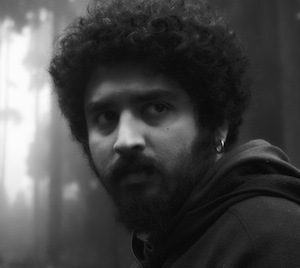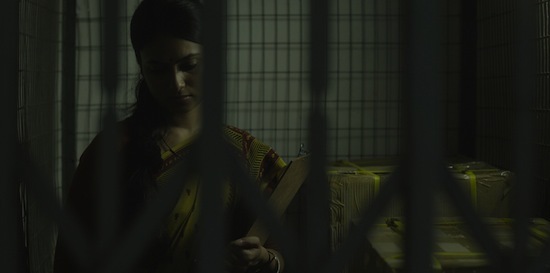"A film is never really good unless the camera is an eye in the head of a poet." -- Orson Welles
Those who know me have heard this story quite a few times, the one about how I called it a wrap and stopped watching films at a festival earlier this year, after viewing one particularly poetic one that simply crowned the event.
That festival was Venice, and the film Aditya Vikram Sengupta's Labour of Love.
Urged by a friend, the in-house publicist of Venice Days -- the favorite sidebar that was screening the film -- I dragged my feet and stood in line for the world premiere of the Bengali film. It was the afternoon of a particularly hectic day, I was leaving Venice the next day, I needed to watch two other films and interview the heavyweight filmmaker who'd made one of them in the morning. Truly, "the last thing I need is Labour of Love," I thought... So I hoped the screening would be sold out, it sure looked like it from the long line of eager audiences waiting outside the Sala Perla -- an intimate venue which holds 450 at its fullest. I was the last one standing.
Needless to say I got in, and ended up canceling the next two screenings, as well as the star filmmaker interview. After watching Sengupta's lyrical masterpiece, I was done. My Venice Film Festival was complete. My soul had gotten its fill of wonder and magic, what I go to festivals expecting from cinema.
To describe Labour of Love would prove a personal labor in futility. But what I can say is that it is a film richly shot, beautifully written and acted so organically, I simply felt overwhelmed by its message for days after viewing it. When I sat with Sengupta and the languid Jonaki Bhattacharya -- his partner in life as well as in production -- in Abu Dhabi, where the film received a Special Jury Mention in the festival's New Horizon section, they disclosed the budget of the film, which I'll leave unnamed for the sake of great cinema. But lets just say, most spend more on a holiday than this wondrous team spent on their perfect work of art.
Following is a chat with Sengupta and Bhattacharya, taped during the Abu Dhabi Film Festival, an easy moment in time when I felt I was sitting across from two intelligent human beings who didn't need to prove their smart, rather opted for a conversation. A learning experience for me and one I will not forget. Hail to the new voice in Bengali cinema!
You financed the film yourself, why?
 Aditya Vikram Sengupta: Initially I was working on a different film, for around three or four years I'd been developing that project... You've seen films by Béla Tarr, I find some of his work very intriguing. And I'd seen this film called The Turin Horse, which was his latest project. He had a cinematographer who is also a German director and he teaches cinema. I got in touch with him, Fred Kelemen, because I like him so much, and I discusses my script with him and he really liked it. Because he had been to Calcutta, he's seen the place and it's a very spiritual sort of film, a period drama, an internal journey of this one servant to an aristocrat. He really liked it and wanted to shoot the film but it was just impossible for me to get funding. It was just impossible.
Aditya Vikram Sengupta: Initially I was working on a different film, for around three or four years I'd been developing that project... You've seen films by Béla Tarr, I find some of his work very intriguing. And I'd seen this film called The Turin Horse, which was his latest project. He had a cinematographer who is also a German director and he teaches cinema. I got in touch with him, Fred Kelemen, because I like him so much, and I discusses my script with him and he really liked it. Because he had been to Calcutta, he's seen the place and it's a very spiritual sort of film, a period drama, an internal journey of this one servant to an aristocrat. He really liked it and wanted to shoot the film but it was just impossible for me to get funding. It was just impossible.
So that's when Labour of Love came in?
Sengupta: Yeah. So we went ahead and financed it ourselves. And we put in all our savings, we keep doing these ad films in Bombay, so whatever we keep earning from there we are still putting into the film. It's been really difficult.
Was the lack of outside financing because there is no star-power attached, or was it the story?
Sengupta: Producers in India have a kind of mold which they think is the kind of mold that will work and generate money. And they are not willing to get out of that mold. So any story, some way or the other, should somehow represent that mold. Even if it's a The Lunchbox, somehow it has parts of that mold in it. Everyone fits in it, apart from people like Amit Dutta or Adoor Gopalakrishnan... It's taken them a lot of time to establish that kind of cinema and that kind of cinema makes money.
The argument I hear often is that Indian cinema doesn't need international audiences, since it already has a large audience built into the culture. Do you think Indian producers are only thinking of Indian audiences then?
Sengupta: Even if you only think for Indian audiences, they are also very receptive to new ideas. So I don't know why they've taken Indian audiences for granted and they are assuming that they only want that, when it's not. And Indian audiences are now getting really cheesed off because they are assumed to be stupid.
Jonaki Bhattacharya: And it's such a wide audience as well, because the country is so large -- there are a lot of different layers. It's not the same kind who like the same things. I would like different things and people from a different economic background would like a different thing. We have lots of different layers but most of the time it's not catered to everybody. Our friends don't watch those [formulaic] films, they watch old cinema.
Sengupta: I was just thinking, there are Indian films that are coming out which do not have a female lead, like the heroine. Would people not go to watch the film? Of course they will go. Maybe the first two they won't go, or maybe a certain crowd who just want to "lech" at women won't go. But now because everything is on the internet, you don't need to go to the theater... When we were small, we wanted to check out the women on big screens and there was no other access to that. Which is why we used to go to theaters. But now people go to the theater to watch films.
Bhattacharya: Yet all the films that have bigger distributors, all of them have the core formula.
But it's now a different formula from old Hindi cinema, right?
Sengupta: Bollywood used to be an industry that had a very strong formula. Which was primarily story, storytelling. And till the mid-90s there were Bollywood films, obviously all the dance and romance would be there, but there used to be really strong stories. Even now, we watch them. These days, everything is there but the story, because people are just lazy...
Bhattacharya: I realize now that we work in Bombay and we meet a lot of people who are in the film industry, they're essentially working because there is a lot of money in this industry. Before I knew a lot of people who came to work in films because they were passionate about making films. Now once the industry became successful, the people seeing that success are only coming for money, not with the passion.
Sengupta: People made films because there was a story to tell and now people are making films because there is money to earn.
What are you thoughts about Venice and Abu Dhabi, the two places where I've been fortunate to watch your film?
Sengupta: Venice was amazing, we kind of did a cold entry and the fact that it was selected was a huge thing for us. We had great guys in our section including Kim Ki-duk, Larry Clark and all these guys. It was very overwhelming and I was very nervous at the world premiere. In Abu Dhabi, the whole intent of the festival is different -- to create a world perception about the country. Wrinkles will only come with time, you can't make them. And here, in Abu Dhabi, they have to give it that time. Go through those years. It's like my film, you can't cheat time. You have to go through the ups and downs, you have to have all the wear and tear happen and then they will evolve a culture.
You've just given birth to your beautiful Labour of Love, and how rude of me to ask this question. But what is your dream project, what will you be working on next?
Sengupta: There is no dream project as such, there are just these feelings that I have which I feel like expressing. The expressive side of me in real life is generally very goofy and the things that I can't express are what go into the films. I can only express those through images and words. I am very inarticulate, like if you ask me to talk about my film and how I want to express it, it will be very difficult for me. I can't clinically sit, I mean I do it to some extent but it's very emotional when I'm designing the film. It's like I'm talking to someone. I've always had a connection with dogs. That's one feeling I want to take forward the way that dogs make me feel. There are feelings that I get from Goddess Kali and the myths around her, which make me feel a certain way again, which I want to express. There are feelings that I get about my city and the strange metamorphosis that Calcutta is undergoing. Everything is incomplete, everything is in transition for the last ten years, nothing is complete. There are flyovers which are half-built. There are people that don't know how they want to dress up or how they want to talk, because they are confused on what they want to be. That is very interesting and makes me feel very strongly.
All images courtesy of ADFF, used with permission.


